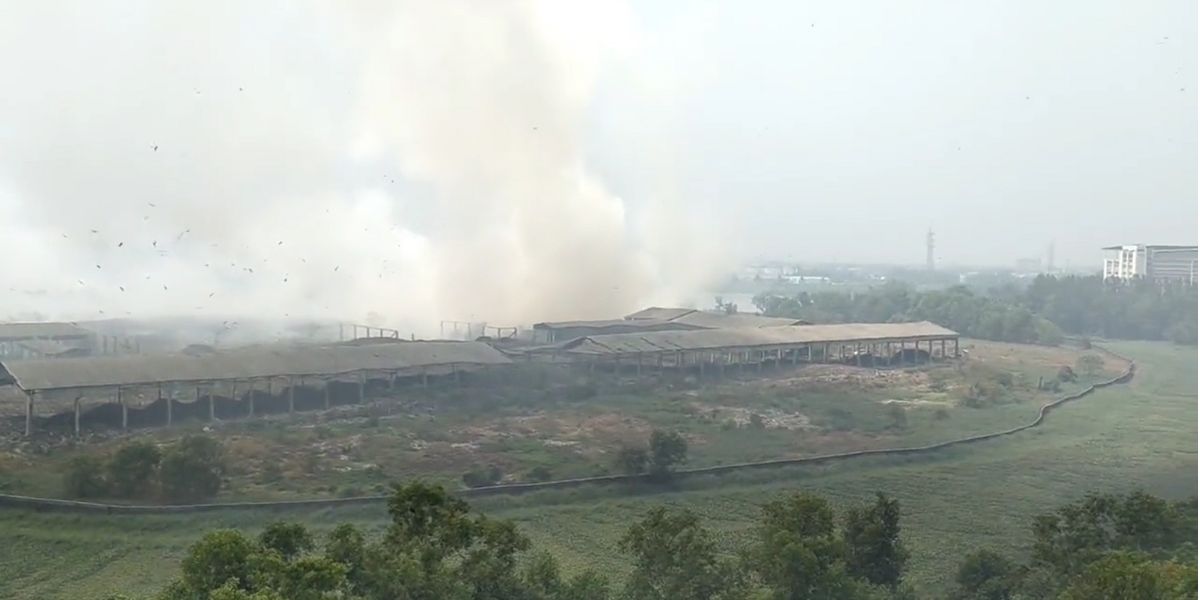The high court directed the Additional Chief Secretary to order the district collector to carry out the study and submit a report on it.

Smoke rising from the Brahmapuram waste plant fire. (File pic/Screengrab)
The Kerala High Court has directed the state government to carry out a socio-economic impact study with regard to the effect of the “unauthorised handling” of municipal solid waste at Brahmapuram on the people living in a 5-km radius of the garbage dump site.
The high court directed the additional chief secretary to order the Ernakulam district collector to carry out the study and place a report before it.
The report should give the impact on the health of the people living within a 500-metre radius of the site, a 2-km radius and a 5-km radius, the court said.
“The study can be on random samples to be decided by the District Administration,” it said.
The order came on a plea by several residents’ associations seeking directions to the local bodies to commence necessary measures to prevent waste from flowing into the water bodies during the monsoons.
The court said that any steps taken by local bodies in Brahmapuram which would aggravate the living conditions of the people there could be brought to its notice and it would pass orders, as necessary, after looking into their grievances.
The court also said that wherever municipal solid waste is dumped in Brahmapuram by agencies transporting it, steps should be taken to set up temporary sheds to store it till segregation is handled.
“Within 15 days, the temporary sheds are to be put in place to prevent the percolation of pollution from municipal solid waste during the rainy season into soil and water bodies,” the court said in its 8 June order.
It directed the additional chief secretary to issue an order regarding setting up sheds to the district collector and the Kochi Municipal Corporation.
The Brahmapuram waste plant caught fire on 2 March and the authorities were able to extinguish it only on 14 March. The port city of Kochi was blanketed in toxic smoke due to the fire during that time.
On 7 March, the Kerala High Court observed that the fire had put Kochi, the commercial capital of Kerala, in a gas chamber-like situation.
Kerala Chief Minister Pinarayi Vijayan, on 15 March, announced a three-tier probe by different agencies into the fire.
A special investigation team (SIT) of the state police was formed to investigate the criminal case registered in connection with the fire.
There were also viral claims that the rain that came soon after the fire was doused was acidic in nature.
However, the Kerala State Pollution Control Board (KSPCB) confirmed on 16 March that no tests were conducted by it to confirm whether the rain was acidic.
On 26 March, another fire broke out again at the waste treatment plant.
The police said eight fire tenders had been pressed into service to douse the fire, which was detected at sector seven inside the plant.
On 19 March, the National Green Tribunal (NGT) fined the Kochi Municipal Corporation ₹100 crore for its continuing neglect of the Brahmapuram solid waste plant fire.
In a scathing report, NGT pulled up the city corporation for long-continuing neglect of its duties and asked the Kerala chief secretary to fix the accountability of officers concerned for the gross failure.
The green tribunal also observed that the state of Kerala and the authorities concerned had been an “utter failure” and “rampantly violated the solid waste management rules”.
The Kerala High Court, on 11 April, granted an interim stay on the NGT order imposing a fine.
The high court granted an interim stay for eight weeks and directed the district collector and the corporation secretary to apprise it of the situation on 2 May.
(With PTI inputs)

May 19, 2024

May 19, 2024

May 18, 2024

May 18, 2024

May 18, 2024

May 18, 2024